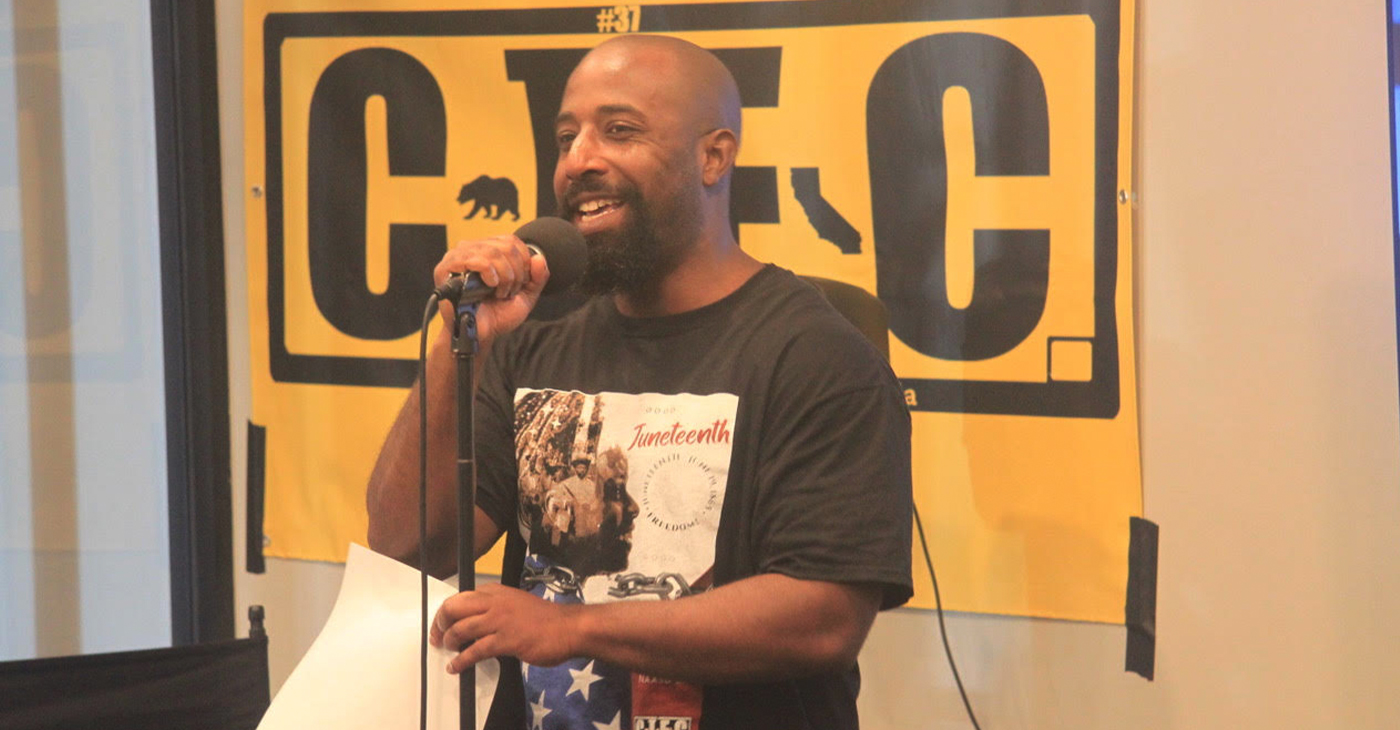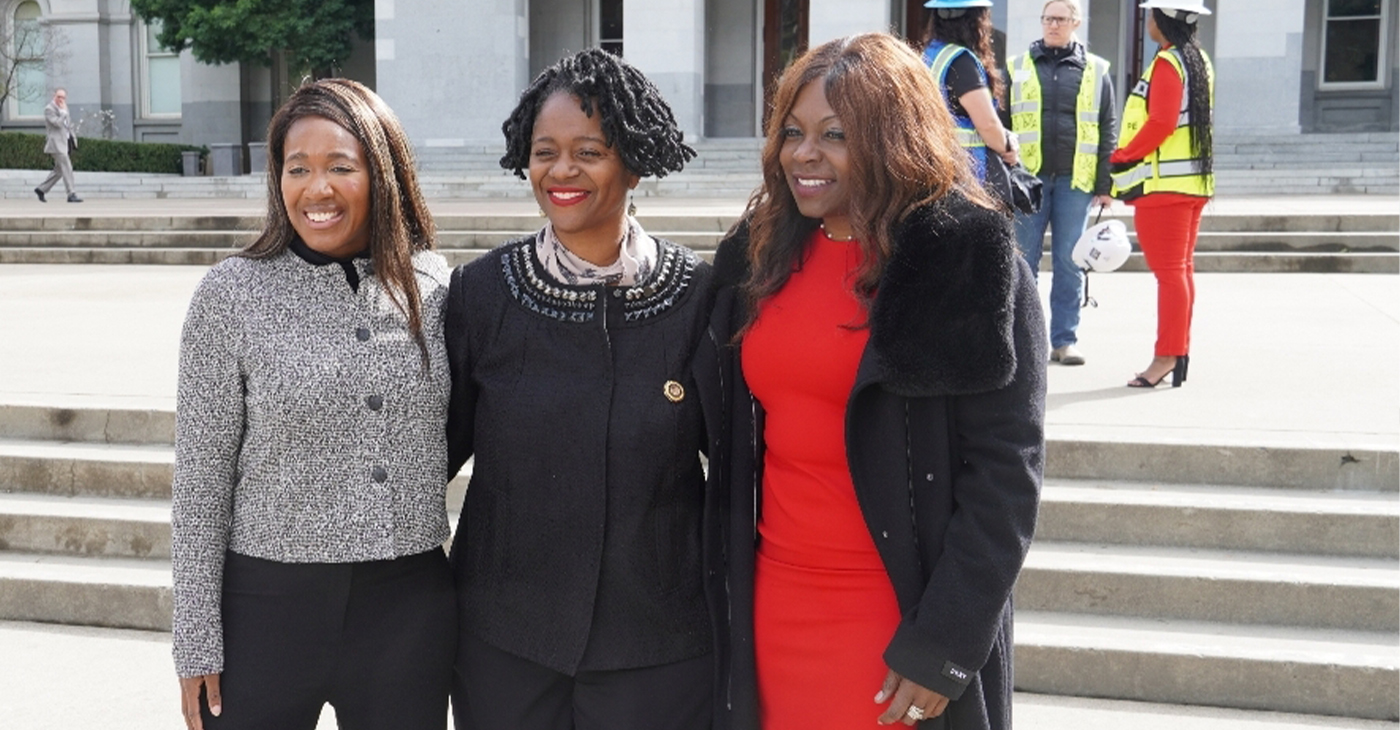Antonio Ray Harvey
Supporting Reparations: Questions for the Coalition for a Just and Equitable California
The Coalition for a Just and Equitable California (CJEC) is a statewide organization comprised of various associations, community groups, and individuals united by a commitment to fight for reparations and reparative justice for descendants of enslaved Black American men and women.

By Antonio Ray Harvey
California Black Media
The Coalition for a Just and Equitable California (CJEC) is a statewide organization comprised of various associations, community groups, and individuals united by a commitment to fight for reparations and reparative justice for descendants of enslaved Black American men and women.
In 2020, CJEC worked alongside California Secretary of State Dr. Shirley Weber when she was an Assemblymember representing the 79th District in San Diego, to author and enact Assembly Bill (AB) 3121.
That bill, now state law, created America’s first-in-the-nation Task Force to Study and Develop Reparations Proposals for African Americans.
CJEC was one of seven “anchor organizations” sanctioned by the Reparations Task Force and the California Department of Justice (DOJ) to host a series of “listening sessions” designed to ensure certain communities in the state provided their thoughts and concerns about the work the task force was doing.
In addition, CJEC helped the task force evaluate California’s role in slavery and Jim Crow discrimination – and followed that work with developing resolutions to compensate African Americans for past and ongoing race-based injustices.
During one of CJEC’s listening sessions, the organization introduced Marian and Michael Johnson, sister and brother, members of a Black family that lost property in Russell City due to eminent domain. Russell City was an unincorporated majority Black community located between the Bay Area cities of Oakland and Hayward. Their story garnered national press coverage.
CJEC is also a community co-sponsor of Assembly Constitutional Amendment (ACA) 8 — the Ending Slavery in California Prisons Act of 2023-24.
The California Constitution prohibits slavery and prohibits involuntary servitude, except as punishment for a crime. Authored by Assemblymember Lori Wilson (D-Suisun City), who is also chair of the California Legislative Black Caucus, said ACA 8 called for prohibiting slavery in any form, including forced labor compelled by the use or threat of physical or legal coercion in California prisons.
ACA 8 received the two-thirds vote required during the legislative session, and a constitutional amendment was placed on the ballot for the November 2024 general election to allow the voters of California to decide its fate.
California Black Media spoke with Chris Lodgson, a CJEC member, about the organization’s advocacy and the work it is doing to support the fight for reparations in California.
What does your organization do to improve the lives of Black people in California?
CJEC works to improve the lives of Black Californians who descend from persons enslaved in the U.S. by organizing, mobilizing, and advocating for strong lineage-based Reparations.
What was your greatest success over the course of the last year?
Over the course of last year our greatest successes include:
First, we helped the California Reparations Task Force successfully complete its work developing Reparations recommendations, which were submitted to the Governor, State Senate, and State Assembly.
Second, was the passage and signing by the Governor of legislation we wrote that will require California state agencies to collect data on descendants of U.S. Chattel Slavery. Currently our State does not have a way to measure the living conditions of those of us whose Ancestors were enslaved in this country.
Third, organizing and hosting over a dozen Reparations community meetings, town halls, listening sessions, and panel events.
In your view, what is the biggest challenge Black Californians face?
The biggest challenge Black Californians face is making ends meet to feed and support our families.
What was your organization’s biggest challenge?
The biggest challenge and opportunity our organization faced over the last year was raising awareness about California’s Reparations efforts.
Does your organization support or plan to get involved in the push for reparations in California?
Absolutely. We are California’s first, only and leading state-wide grassroots organization born specifically for lineage-based reparations and reparative justice.
How can more Californians of all backgrounds get involved in the work you’re doing?
Visit our website at www.cjec.org
Activism
California Rideshare Drivers and Supporters Step Up Push to Unionize
Today in California, over 600,000 rideshare drivers want the ability to form or join unions for the sole purpose of collective bargaining or other mutual aid and protection. It’s a right, and recently at the State Capitol, a large number of people, including some rideshare drivers and others working in the gig economy, reaffirmed that they want to exercise it.

By Antonio Ray Harvey
California Black Media
On July 5, 1935, President Franklin D. Roosevelt signed into federal law the National Labor Relations Act (NLRA). Also known as the “Wagner Act,” the law paved the way for employees to have “the right to self-organization, to form, join, or assist labor organizations,” and “to bargain collectively through representatives of their own choosing, according to the legislation’s language.
Today in California, over 600,000 rideshare drivers want the ability to form or join unions for the sole purpose of collective bargaining or other mutual aid and protection. It’s a right, and recently at the State Capitol, a large number of people, including some rideshare drivers and others working in the gig economy, reaffirmed that they want to exercise it.
On April 8, the rideshare drivers held a rally with lawmakers to garner support for Assembly Bill (AB) 1340, the “Transportation Network Company Drivers (TNC) Labor Relations Act.”
Authored by Assemblymembers Buffy Wicks (D-Oakland) and Marc Berman (D-Menlo Park), AB 1340 would allow drivers to create a union and negotiate contracts with industry leaders like Uber and Lyft.
“All work has dignity, and every worker deserves a voice — especially in these uncertain times,” Wicks said at the rally. “AB 1340 empowers drivers with the choice to join a union and negotiate for better wages, benefits, and protections. When workers stand together, they are one of the most powerful forces for justice in California.”
Wicks and Berman were joined by three members of the California Legislative Black Caucus (CLBC): Assemblymembers Tina McKinnor (D-Inglewood), Sade Elhawary (D-Los Angeles), and Isaac Bryan (D-Ladera Heights).
Yvonne Wheeler, president of the Los Angeles County Federation of Labor; April Verrett, President of Service Employees International Union (SEIU); Tia Orr, Executive Director of SEIU; and a host of others participated in the demonstration on the grounds of the state capitol.
“This is not a gig. This is your life. This is your job,” Bryan said at the rally. “When we organize and fight for our collective needs, it pulls from the people who have so much that they don’t know what to do with it and puts it in the hands of people who are struggling every single day.”
Existing law, the “Protect App-Based Drivers and Services Act,” created by Proposition (Prop) 22, a ballot initiative, categorizes app-based drivers for companies such as Uber and Lyft as independent contractors.
Prop 22 was approved by voters in the November 2020 statewide general election. Since then, Prop 22 has been in court facing challenges from groups trying to overturn it.
However, last July, Prop 22 was upheld by the California Supreme Court last July.
In a 2024, statement after the ruling, Lyft stated that 80% of the rideshare drivers they surveyed acknowledged that Prop 22 “was good for them” and “median hourly earnings of drivers on the Lyft platform in California were 22% higher in 2023 than in 2019.”
Wicks and Berman crafted AB 1340 to circumvent Prop 22.
“With AB 1340, we are putting power in the hands of hundreds of thousands of workers to raise the bar in their industry and create a model for an equitable and innovative partnership in the tech sector,” Berman said.
Activism
Barbara Lee Accepts Victory With “Responsibility, Humility and Love”
“I accept your choice with a deep sense of responsibility, humility, and love. Oakland is a deeply divided City,” Lee said in an April 19 statement. “I answered the call to run to unite our community, so that I can represent every voter, and we can all work together as One Oakland to solve our most pressing problems.”

By Antonio Ray Harvey,
California Black Media
As a candidate for mayor, former U.S. Representative Barbara Lee released a “10-point plan” last week to reassure residents that she will tackle Oakland’s most pressing challenges.
Now that she has edged out her competitors in the ranked-choice special election with 50% or more of the vote, the former Congresswoman, who represented parts of the Bay Area in the U.S. House of Representatives, can put her vision in motion as the city’s first Black woman mayor.
“I accept your choice with a deep sense of responsibility, humility, and love. Oakland is a deeply divided City,” Lee said in an April 19 statement. “I answered the call to run to unite our community, so that I can represent every voter, and we can all work together as One Oakland to solve our most pressing problems.”
On Saturday evening, Taylor conceded to Lee. There are still about 300 Vote-by-Mail ballots left to be verified, according to county election officials. The ballots will be processed on April 21 and April 22.
“This morning, I called Congresswoman Barbara Lee to congratulate her on becoming the next Mayor of Oakland,” Taylor said in a statement.
“I pray that Mayor-Elect Lee fulfills her commitment to unify Oakland by authentically engaging the 47% of Oaklanders who voted for me and who want pragmatic, results-driven leadership.”
The influential Oakland Post endorsed Lee’s campaign, commending her leadership on the local, state, and federal levels.
Paul Cobb, The Post’s publisher, told California Black Media that Lee will bring back “respect and accountability” to the mayor’s office.
“She is going to be a collegial leader drawing on the advice of community nonprofit organizations and those who have experience in dealing with various issues,” Cobb said. “She’s going to try to do a consensus-building thing among those who know the present problems that face the city.”
Born in El Paso, Texas, Lee’s family moved to California while she was in high school. At 20 years old, Lee divorced her husband after the birth of her first child. After the split, Lee went through a tough period, becoming homeless and having to apply for public assistance to make ends meet.
But destitution did not deter the young woman.
Lee groomed herself to become an activist and advocate in Oakland and committed to standing up for the most vulnerable citizens in her community.
Lee traveled to Washington, D.C. to work for then U.S. Congressman Ron Dellums after receiving a Bachelor of Arts degree from Mills College in Oakland in 1973. Lee later won a U.S. Department of Housing and Urban Development (HUD) fellowship to attend the School of Social Welfare, and she earned a Master of Social Work from the University of California-Berkeley in 1975.
Lee later served in the California State Assembly and State Senate before she was elected to Congress in 1998.
After serving in the U.S. Congress for more than 25 years, Lee ran unsuccessfully for California’s U.S. Senate in the 2024 primary election.
Lee joins current Los Angeles mayor Karen Bass and former San Francisco Mayor London Breed as Black women serving as chief executives of major cities in California over the last few years.
Activism
Sen. Lola Smallwood-Cuevas Honors California Women in Construction with State Proclamation, Policy Ideas
“Women play an important role in building our communities, yet they remain vastly underrepresented in the construction industry,” Smallwood-Cuevas stated. “This resolution not only recognizes their incredible contributions but also the need to break barriers — like gender discrimination.

By Antonio Ray Harvey, California Black Media
To honor Women in Construction Week, Sen. Lola Smallwood-Cuevas (D-Los Angeles), a member of the California Legislative Black Caucus (CLBC), introduced Senate Concurrent Resolution (SCR) 30 in the State Legislature on March 6. This resolution pays tribute to women and highlights their contributions to the building industry.
The measure designates March 2, 2025, to March 8, 2025, as Women in Construction Week in California. It passed 34-0 on the Senate floor.
“Women play an important role in building our communities, yet they remain vastly underrepresented in the construction industry,” Smallwood-Cuevas stated. “This resolution not only recognizes their incredible contributions but also the need to break barriers — like gender discrimination.
Authored by Assemblymember Liz Ortega (D-San Leandro), another bill, Assembly Concurrent Resolution (ACR) 28, also recognized women in the construction industry.
The resolution advanced out of the Assembly Committee on Rules with a 10-0 vote.
The weeklong event coincides with the National Association of Women In Construction (NAWIC) celebration that started in 1998 and has grown and expanded every year since.
The same week in front of the State Capitol, Smallwood, Lt. Gov. Eleni Kounalakis, Assemblymember Josh Hoover (R-Folsom), and Assemblymember Maggie Krell (D-Sacramento), attended a brunch organized by a local chapter of NAWIC.
Two of the guest speakers were Dr. Giovanna Brasfield, CEO of Los Angeles-based Brasfield and Associates, and Jennifer Todd, President and Founder of LMS General Contractors.
Todd is the youngest Black woman to receive a California’s Contractors State License Board (A) General Engineering license. An advocate for women of different backgrounds, Todd she said she has been a woman in construction for the last 16 years despite going through some trying times.
A graduate of Arizona State University’s’ Sandra Day O’Connor College of Law, in 2009 Todd created an apprenticeship training program, A Greener Tomorrow, designed toward the advancement of unemployed and underemployed people of color.
“I always say, ‘I love an industry that doesn’t love me back,’” Todd said. “Being young, female and minority, I am often in spaces where people don’t look like me, they don’t reflect my values, they don’t reflect my experiences, and I so persevere in spite of it all.”
According to the U.S. Bureau of Labor Statistics, only 11.2% of the construction workforce across the country are female. Overall, 87.3% of the female construction workers are White, 35.1% are Latinas, 2.1% are Asians, and 6.5% are Black women, the report reveals.
The National Association of Home Builders reported that as of 2022, the states with the largest number of women working in construction were Texas (137,000), California (135,000) and Florida (119,000). The three states alone represent 30% of all women employed in the industry.
Sen. Susan Rubio (D-Baldwin Park) and the California Legislative Women’s Caucus supported Smallwood-Cuevas’ SCR 30 and requested that more energy be poured into bringing awareness to the severe gender gap in the construction field.
“The construction trade are a proven path to a solid career. and we have an ongoing shortage, and this is a time for us to do better breaking down the barriers to help the people get into this sector,” Rubio said.
-

 Activism4 weeks ago
Activism4 weeks agoOakland Post Endorses Barbara Lee
-

 Activism3 weeks ago
Activism3 weeks agoOakland Post: Week of April 2 – 8, 2025
-

 #NNPA BlackPress3 weeks ago
#NNPA BlackPress3 weeks agoTrump Profits, Black America Pays the Price
-

 Activism2 weeks ago
Activism2 weeks agoOakland Post: Week of April 9 – 15, 2025
-

 #NNPA BlackPress3 weeks ago
#NNPA BlackPress3 weeks agoHarriet Tubman Scrubbed; DEI Dismantled
-

 #NNPA BlackPress3 weeks ago
#NNPA BlackPress3 weeks agoTrump Targets a Slavery Removal from the National Museum of African-American History and Culture
-

 #NNPA BlackPress3 weeks ago
#NNPA BlackPress3 weeks agoLawmakers Greenlight Reparations Study for Descendants of Enslaved Marylanders
-

 #NNPA BlackPress3 weeks ago
#NNPA BlackPress3 weeks agoNew York Stands Firm Against Trump Administration’s Order to Abandon Diversity in Schools





















































